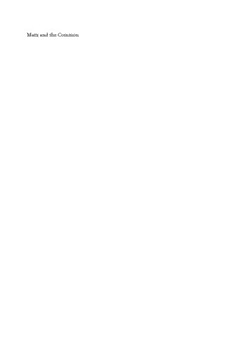
Marx and the common: from capital to the late writings PDF
Preview Marx and the common: from capital to the late writings
MarxandtheCommon Historical Materialism Book Series EditorialBoard SébastienBudgen(Paris) SteveEdwards(London) JuanGrigera(London) MarcelvanderLinden(Amsterdam) PeterThomas(London) volume105 Thetitlespublishedinthisseriesarelistedatbrill.com/hm Marx and the Common FromCapitaltotheLateWritings By LucaBasso Translationby DavidBroder leiden | boston ThisbookisatranslationofanupdatedandrevisededitionofOmbreCorteEdizioniasAgireincomune. Antropologiaepoliticanell’ultimoMarx,Verona,2012(ISBN:9788897522294). LibraryofCongressCataloging-in-PublicationData Basso,Luca,author. [Agireincomune.English] Marxandthecommon:fromcapitaltothelatewritings/byLucaBasso;translationbyDavidBroder. pagescm.–(Historicalmaterialismbookseries,ISSN1570-1522;105) "FirstpublishedinItalianbyOmbreCorteEdizioniasAgireincomune.Antropologiaepolitica nell'ultimoMarx,Verona,2012." Includesbibliographicalreferencesandindex. ISBN978-90-04-29688-6(hardback:alk.paper)–ISBN978-90-04-30514-4(e-book) 1.Marx,Karl,1818-1883.2.Capitalism.3.Individualism.I.Title. HX39.5.B367132016 335.4–dc23 2015029549 Thispublicationhasbeentypesetinthemultilingual“Brill”typeface.Withover5,100characterscovering Latin,ipa,Greek,andCyrillic,thistypefaceisespeciallysuitableforuseinthehumanities.Formore information,pleaseseewww.brill.com/brill-typeface. issn1570-1522 isbn978-90-04-29688-6(hardback) isbn978-90-04-30514-4(e-book) Copyright2015byKoninklijkeBrillnv,Leiden,TheNetherlands. KoninklijkeBrillnvincorporatestheimprintsBrill,BrillHes&DeGraaf,BrillNijhoff,BrillRodopiand HoteiPublishing. Allrightsreserved.Nopartofthispublicationmaybereproduced,translated,storedinaretrievalsystem, ortransmittedinanyformorbyanymeans,electronic,mechanical,photocopying,recordingorotherwise, withoutpriorwrittenpermissionfromthepublisher. AuthorizationtophotocopyitemsforinternalorpersonaluseisgrantedbyKoninklijkeBrillnvprovided thattheappropriatefeesarepaiddirectlytoTheCopyrightClearanceCenter,222RosewoodDrive, Suite910,Danvers,ma01923,usa.Feesaresubjecttochange. Thisbookisprintedonacid-freepaper. Contents Introduction 1 1 FetishismandSubjects:BetweenRealityandMystification 6 The‘Enigma’oftheCommodity 6 TheQuestionofFetishism:AnotherNamefor‘Ideology’? 14 TheConstitutionofIndividuality,betweenthe‘Economic’andthe ‘Juridical’:The‘EdenoftheRightsofMan’ 23 FromtheCommoditytoCapital,betweenProductionand Circulation:The‘TrinityFormula’ 31 ThePerson-as-Mask:AHobbesianMarx? 40 HasFetishismAlwaysExisted?‘Excursus’onPrecapitalistForms 48 2 EthnologyandFormsof‘theCommon’ 54 The‘New’AnthropologyofCapitalism:FromtheGrundrisseto Capital 54 TheStudyofCommunitarianForms,betweentheNaturaland HistoricalSciences:TheEthnologicalNotebooks 64 BeyondEurope 77 TheRussianCommuneandtheConditionsofPossibilityof Communism 85 TheCoexistenceofNoncapitalistandCapitalistStructures 99 3 IndividualSeparation 108 ‘Trennung’andCapitalism:TheErosionofCommonProperty 108 AgainonAlienation? 115 TheMomentsofSeparation:Co-Operation,Manufacture,Modern Industry 121 TheFactoryandClassFormation 135 4 SubjectivityandClass:TheSpaceofPolitics 146 The‘PoliticalCharacter’ofClass:FromtheGermanIdeologyto CapitalVolumeiii 146 TheStruggleovertheWorkingDay:BetweenReformsand Revolution 155 ClassandOrganisation,betweenAnarchismandStatism:Marxversus BakuninandLassalle 163 TheParisCommune:A‘Working-ClassGovernment’ 177 vi contents The‘Metamorphous’CharacterofPolitics:TheCorrectionofthe Manifesto 189 Communismandthe‘TotallyDevelopedIndividual’:AScenarioFree ofFetishism? 196 Conclusion 202 References 207 Index 221 Introduction [AccordingtoLeChapelier,givingthedecreeof14June1791inFrance]the workersmustnotbeallowedtocometoanyunderstandingabouttheir own interests, nor to act in common and thereby lessen their ‘absolute dependence,whichisalmostthatofslavery’. Capital,Volumei … Now, since the state is merely a transitional institution of which use is madeinthestruggle,intherevolution,tokeepdownone’senemiesby force, it is utter nonsense to speak of a free people’s state; so long as theproletariatstillmakesuseofthestate,itmakesuseofit,notforthe purpose of freedom, but of keeping down its enemies and, as soon as therecanbeanyquestionoffreedom,thestateassuchceasestoexist.We wouldthereforesuggestthatGemeinwesen[‘commonalty’]beuniversally substitutedforstate;itisagoodoldGermanwordthatcanverywelldo servicefortheFrench‘Commune’. friedrich engelstoAugustBebel,18–28March1875 ∵ RecentyearshaveseenarenewedinterestinMarx,notleastonaccountofthe worldeconomiccrisis.Thisfollowedtheyearsofdamnatiomemoriaethatres- ultedfromthefailureof‘actually-existingsocialism’andtheuncriticalaccept- anceofcapitalistdominationastheonlypossiblefuture.Certainly,rethinking the problems that Marx posed does require casting off the old orthodoxies, butitisimportantthatwedosowithoutgivinguponthedestructivepower of his thought. A rigorous historical and theoretical analysis of Marx’s texts does not necessarily mean signing up to a ‘depoliticised’ vision of Marx, the ‘classic philosopher’. Nor does consciousness of the crisis in the Marxism– workers’movement–communistpartyplexusnecessarilyleadtosomeMani- cheancounterpositionbetweenMarxandMarxism,holdingthemanhimself in high esteem while seeing Marxism from Engels onward as a mere mysti- fication of some supposed original ‘message’. To appreciate Marx has always © koninklijkebrillnv,leiden,2015 | doi:10.1163/9789004305144_002 2 introduction meanttakinganon-neutral,non-equidistantposition,andthustheMarxisms with the most vitality have always sought to ‘rerun’ Marx’s reflection on the basis of the historical and political conjuncture that they themselves faced. Moreover, the perspective that Marx set out is intrinsically political, as the afterword to the second edition of Capital makes clear: ‘In so far as Political Economy remains within that horizon, in so far, i.e., as the capitalist regime islookeduponastheabsolutelyfinalformofsocialproduction,insteadofas apassinghistoricalphaseofitsevolution,PoliticalEconomycanremainasci- enceonlysolongastheclassstruggleislatentormanifestsitselfonlyinisolated andsporadicphenomena’.Marx’stext‘admits’tosettingoutfromthepointof viewoftheproletariat,whichcannotjustbegraftedontothebourgeoisstand- point.Itenvisagesamaterialtransformationofthepresentsituation,onthe basisofacontinualexchangebetweentheanalysisandthebreaking-apartof thereal. However,norecognitionofthe‘class’characterofMarx’sreflectionandits drivetorevolutioniseexistingassumptionsshouldneglecttheoveralltheoret- icalplaneonwhichhiscritiqueofpoliticaleconomyisbased.Hisevaluationof theworkingclass’spoliticalroledoesnotstandinisolationfromtheconceptual structureofhiscritiqueofpoliticaleconomy:working-classsubjectivitycannot bearticulatedandpractisedwithoutafullexplorationofthe‘spectralobjectiv- ity’ of the capitalist mode of production. As such, in conceiving the theory- praxisrelationship,itisnecessarytotakeaccountnotonlyoftheconnection betweenthesedimensions,butalsoofthefactthattheydonotdirectlymatch: neitherdimensioncanbededucedfromtheother.Inthissense,weoughtalso tobearinmindthepossibleseparationoftheoryfrompolitics.Thedifficulty inherent within this question derives from the fact that even though Marx’s critique of political economy is of political significance, we cannot immedi- atelydeducepoliticsfromthecritiqueofpoliticaleconomy.Twoperspectives thatbothforcefullyposetheproblemoftherelationbetweentheoryandprac- tice–thoughtheyaredifferent,orevenirreconcilable–aretheperspectivesof LouisAlthusser(andhisschool)andofItalianoperaismo.Moreover,notonly dowefacethepossibilityofa‘split’betweentheseelements,butwealsoneed tounderstandthattherealisnotimmediatelyvisibleandtransparent,since thecapitalistmodeofproductionpresentsanopaquecharacter–asbecomes clearinMarx’sanalysisoffetishism,inhispolemicwithclassicalpoliticaleco- nomy. Itisbasedonthesecoordinatesthatthisbook,setoutinfourchapters,exam- inestherelationshipbetweentheindividualandcommunaldimensions,and thustheintersectionoftheindividual,class,society,andcommunity,asdis- cussedbyMarxfromthe1860sonward.Thoughafullyfreestandingwork,from introduction 3 thechronologicalpointofviewitpicksupfromMarxandSingularity,1which revolvedaroundMarx’sjourneyfromhisfirsttextstotheGrundrisse.Indeed, theobjectofthepresentbookisbothCapitalandMarx’slatehistorical-political writings, attributing particular importance to his reflection on the state and the political activity of the working class, with reference to events like the ParisCommuneandtoorganisationsliketheFirstInternational.Fromthese emergeda‘Marxist’politicsthatnotonlyhaditsowninternaldifficulties,but provedclearlyirreconcilablewitheitherBakuniniteanarchismorLassallean statism.Ithenconsider–aswellasnumeroustextslinkedtospecificconjunc- tures, among them particularly telling ones revolving around his analysis of Russia–hisextractsonthenaturalsciences,inprimistheso-calledEthnological Notebooks.Inthissense,thequestionofanthropologydoesnotonlyplayan abstractlyphilosophicalrole,butratherresonateswithitsconstantencounter with politics sans phrases as well as with the natural and social sciences of the time. Furthermore, these writings are useful in studying the question of theformsof‘thecommon’,onthebasisofanarticulatedvisionofthehistor- icalscenario,whichisnotreducibletoWestern-Europeanexperiences.Inthe book’ssubtitle,Ihaveusedtheexpression‘thelateMarx’todenotetheperiod we are here addressing, though the 1860s are also part of our object of ana- lysis, and not only the final years of his output. I have preferred to use this terminologyinordertoavoidfallingintoastatic(and,insomeregards,sterile) counterposition between the ‘young’ and the ‘mature’ Marx, since I am con- vincedthatthereisasubstantialcontinuitythroughoutMarx’strajectory,even ifitisnotlinearandunproblematic. Following the complex relationship between theory and politics, we will seek to examine the relation between the individual and the community, as it concretely appears with its determinate characteristics within the capital- ist mode of production – that is, in its specific difference with regard to the formsofproductionthatprecededit.Iftheselatterweredistinguishedbythe unity of man and the community, the capitalist system is, instead, founded on a structural element of separation: a division that concerns not only the relationbetweenindividualsandthemeansofproduction,butalsotherela- tionbetweeneachindividualandtheirowncapacitytolabour.Thequestion of class plays a crucial function in this terrain, a role that cannot be hypos- tatised at either the ontological or the sociological level, since it poses itself in intrinsically political terms. Moreover, capitalism is the first mode of pro- duction in which antagonism (which is often latent, and not in actu) is not 1 Basso2012. 4 introduction justaneffectofitsdynamic,butitsverycondition:societyisbasedonadivi- sionintotwo,anirreconcilable‘contradictioninprocess’betweencapitaland labour.Withinthissituation,thereemergesapotentiallyexpansivedeclination oflivinglabour,insofarastheuse-valueoflabourpowerisnotonlydirected towardthevalorisationofcapital,butcanalsoconstituteadisruptiveoppos- ition to capital, ‘breaking’ its ‘dead mechanism’. Of course, labour power is notapossession,butratherissoldasthetemporalavailabilityofasubject– theworker.Theworkeristhusleftdeprivedofthemeansofproduction:the capitalist buys something that only exists as a possibility, which is, however, inseparablefromthelivingpersonalityofthe Arbeiter.Thereis,then,anele- mentthatcanneverbe‘cashedin’,sincetheworker’sbodycanneverbefully ‘captured’. Referencestocommunismcontinuouslytraversethishorizon,eventhough Marxrarelydescribeditinanydetailandeventhoughthereareanumberof ambiguities in this regard. Essentially, there are two ways in which he artic- ulated this question. The first – to use the formulation given in the German Ideology–seescommunismas‘therealmovementwhichabolishesthepresent state of things’, that is, it pulls apart the status quo, on the basis of a con- tinual political ‘investment’ in the moments of working-class subjectivation. Thesecondposescommunismasorganisation,aninstitutioncapableofgiv- ingrisetoacommunalgovernmentthatallowsthesepracticesto‘sediment’, rather than dispersing irrecoverably. Insofar as ‘social individuals’ cannot be consideredabletoactinapurelyspontaneousmanner,communismrefersalso to the existence of a plan by which they can control social production. Tak- ingthisapproach,itisnecessaryfirstlytograsptheanticipatorycharacterof strugglesthattakeplacewithincapitalismbutwhicharecommunistintend- ency,and,ontheotherhand,tobefullyawareofcommunism’sdiscontinuity withregardtocapitalism. Whatweareattemptingtodo,here,istoarticulatethe‘actingincommon’, the Gemeinsam handeln (to use an expression cited at the top of this intro- duction,fromMarx’schapteronaccumulation)ofworking-classsingularities, intheirdifferentiation,intheirnon-serialityandantithesis,whenfacedwith wagelabourandthestateforminwhichindividualsaresubsumedtothe‘social power’ of money. We should be aware that in the present situation there is no unique and universal subject, and thus the question of subjectivity is an extremelycomplexandarticulatedone,irreducibletoanyimmediatesolution ortheeasyidentificationofa‘wayout’.Moreover,inthiscontext,wealsoought to register the global dimension of struggles, rejecting any type of commun- alismthatiseitherfunctionaltothestatedynamicorelsepurelyreactiveto it. For Marx, communism was not posed as an ahistorical end, but rather as
